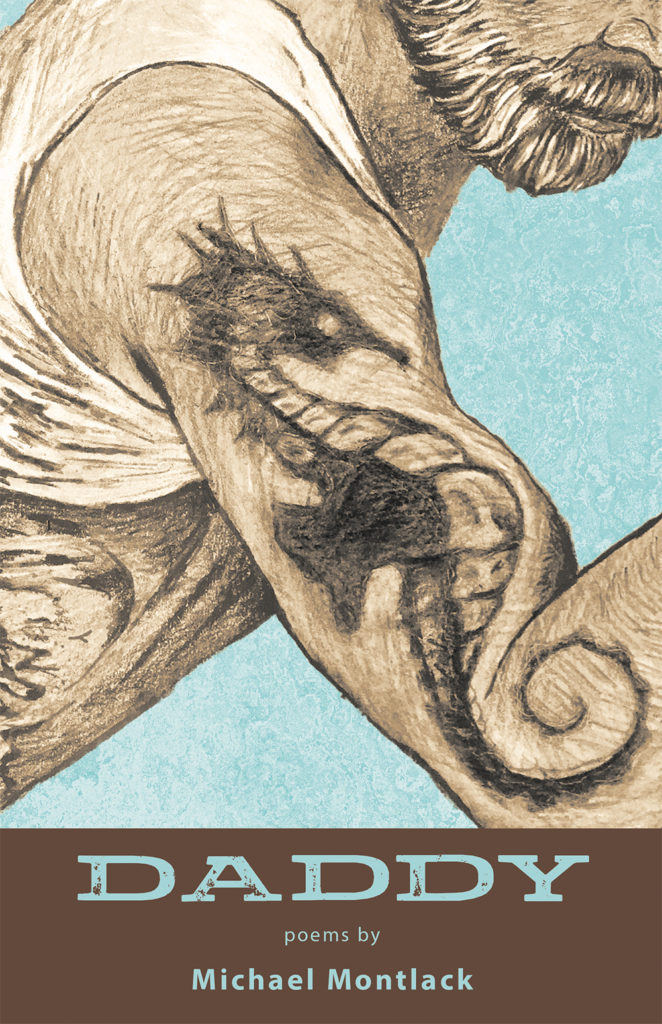Redefining Generational Gender: A Review of Michael Montlack’s ‘Daddy’
By Marina Rubin
Posted on

Michael Montlack’s poetry collection Daddy (NYQ Books, September 7, 2020, 88 pages) is a sweeping vista of allegories and witticisms, and a benevolent contemplation on being a son, a brother, a poet, and a gay man in America.
The book cover is Christopher Shields’ pencil drawing of a man’s muscular arm sporting a tattoo of a seahorse; arresting and intriguing, it’s a warning of the nuanced play on femininity and masculinity that is to come. Appropriately enough, the book opens with a poem, “How to Mother Like a Man,” that talks about a male seahorse giving birth to help the female exhausted from egg production. This sets the tone for the entire collection—a compassionate memoir that transcends defined gender roles and is a celebration of grace, forgiveness, acceptance, and family.
Daddy is divided into three sprawling sections: “Daddy,” “Mother,” and “Father.” There is a logic behind this structure, as the order of poems is designed to deliver an emotional punch.
Michael Montlack, editor of the critically-acclaimed Lambda Finalist anthology My Diva: 65 Gay Men on the Women Who Inspire Them, has a long-standing presence in the LGBTQ community and is a significant voice in gay literature. In the “Daddy” section, Montlack introduces a middle-aged gay poet navigating the world of what was and what is. He writes: “To conjure the 90s Castro, / where I came out, / where I nearly passed out, / my first Friday night at the bars, / seeing men in their mid-thirties, / a little older than me, so emaciated, / so drawn, I had flashbacks / to Hebrew School imagery / of Holocaust survivors.” Beautifully written, these haunting poems pay tribute to brave men who were thrust into the AIDS crisis, and in the midst of fear and death, supported each other in hospitals across America. There are poems about first dates, Valentines, vacations, and break-ups. There is also a lot of humor in this section, through curious and endearing situations that are entertaining to readers of all sexual orientations. Specifically, a series called “Dickorum” delivers major laughs, depicting the absurdities of being gay today, which means “ . . . being the sponge / for all those graphic things / heterosexuals suddenly confess / upon finding out you’re gay…” Or my favorite, “your boss messaging you— / after seeing your Grindr profile one night— / to ask if the monthly budget analysis is done . . . / before he compliments your cockshot.”
The second section, “Mother,” is a powerful and heart-rending homage to all the women in Montlack’s life. This includes the poet’s biological mother, who gave him up for adoption and who believed in aliens, “That when she was dying of breast cancer, / she blamed her pain on things that had fallen / from the sky. /…The six children / she birthed and abandoned or surrendered.” Of the mother who raised him and taught him the meaning of masculinity as he attached her colostomy bag, he writes: “Mother, I could write a poem about any / or all these things. But what I really want / to write is this plain artless plea: I miss you, / Mom. And I miss being someone’s son.” With infinite tenderness, Montlack explores his relationship with his twin sister Michelle, his quirky Aunt Alice, and his niece Kimberly. This section is a celebration of femininity, a love letter to all the mothers, to all the women and men who mother, to pseudo-mothers, to muse-mothers, to Stevie Nicks, Amelia Earhart, the Dowager Countess from Downton Abbey, and even Mother Medusa.
The third section, “Father,” contains the most poignant poems in the book. They are part dedication to Montlack’s father, part meditation on masculinity, paternity, death, and legacy. With awe and veneration, he writes about his father, “No longer the overworked, / overweight husband/father/mechanic recovering/ from a second heart attack, second mortgage, / for in thosesizzling seconds he was King/ of his court / . . . a provider of light, creator of fire.” The poem “Legend” is especially striking: it sees a young man standing up to his father, coming into his own power in an all-encompassing portrait of what it means to be a man. In the poem “Family Affair,” the love and acceptance of a father towards his gay son shines through in the most comical way when he asks his son to give the new family dog a gay name: “Why a gay name? I asked. / I dunno, he said. I just want a gay name. / And my gay son to name him. / Well, what’s a gay name? / You tell me, he said. You’re the expert. / Oscar Wilde? I offered. / Who da hell is that?” In the closing poems, the poet grapples with the death of his parents, asking the question, “Do parents really die?” and imagining them still sitting on the couch in his childhood home, waiting for their favorite TV show.
Montlack demonstrates a mastery of poetic technique as he depicts human relationships in all their ambiguity. With great attention to language, crafty storytelling, humor, and wit, Daddy is a thought-provoking journey, a reconciliation, as one man comes to terms with being adopted, being middle-aged, losing his parents, and celebrating his own kind of fatherhood. “When you say Uncle, / I realize I am home. / When you say Uncle, / it is enough . . .” The book delivers a universal message—anyone with love, gentleness, and devotion in their heart can be a mother; regardless of gender or DNA, anyone can be a father; and absolutely anyone can be a Daddy.
– Marina Rubin